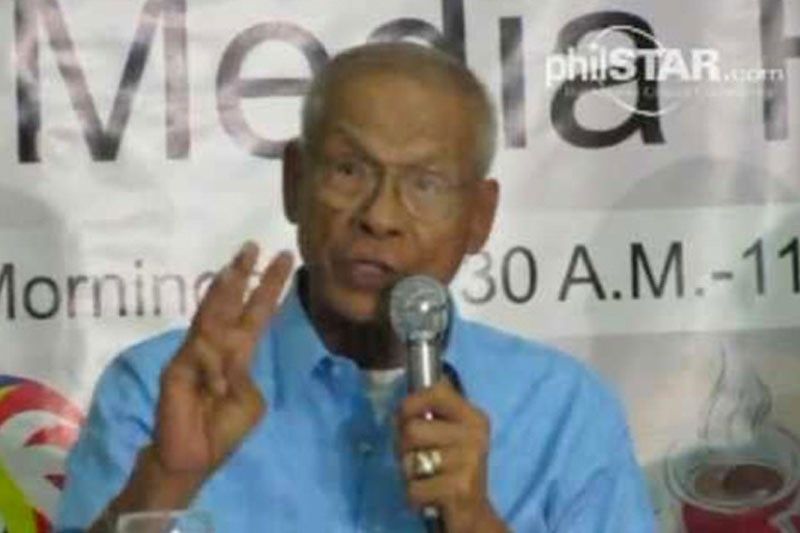Ex-military officers warn vs amnesty revocation

MANILA, Philippines — Two former military officers warned the administration of the implications of President Duterte’s move to revoke the amnesty granted to Sen. Antonio Trillanes IV on the future efforts of the government to attain peace with enemies of the state.
Speaking on ‘The Chiefs’ program of Cignal TV’s One News channel, former Armed Forces of the Philippines chief Rodolfo Biazon and former 1Lt. Francisco “Ashley” Acedillo aired their concern over the unilateral revocation of Trillanes’ amnesty, which has never been done before.
Biazon, also a former senator, said the grant of amnesty has always been done as a demonstration of the government’s sincerity in pursuing peace with its enemies.
“The grant of amnesty is an attempt to bring peace to the land. The grant of amnesty is a peace consideration,” said Biazon.
He recalled how previous administrations have granted amnesty to members of groups such as the Reform the Armed Forces Movement, the Communist Party of the Philippines, Moro National Liberation Front and even the Magdalo Group and that these were done with the concurrence of Congress.
Trillanes led the Magdalo Group of rebel soldiers that mounted a coup against former president Gloria Macapagal-Arroyo.
Now by revoking the amnesty granted to Trillanes, Biazon said that the same amnesty given to other personalities such as Metropolitan Manila Development Authority chairman Danny Lim, Sen. Gregorio Honasan and even incumbent AFP chief Gen. Carlito Galvez Jr. could also be revoked in an instant without consulting Congress.
“The grant of amnesty is a shared power between the President and the legislature,” said Biazon, who also once served as a member of the House of Representatives.
Acedillo, who was granted amnesty together with Trillanes as part of the Magdalo Group, noted how even the late dictator Ferdinand Marcos issued 12 amnesty proclamations during his term and none of these were withdrawn.
He said that the grant of amnesty has proven to be an effective tool for peace and as such, the unprecedented move of Duterte to revoke Trillanes’ amnesty could have dire consequences in the future.
“What is more troubling is it deprives future administrations of this tool for peace. Because the signal now is if you talk to the government about peace and there is an amnesty offer on the table, I cannot hold on to that because that can be withdrawn at any time and unilaterally, even without consent of Congress,” said Acedillo, who was a former party-list representative.
Acedillo said that he and his fellow Magdalo Group members are also wary of the possibility that the amnesty granted to them could also be revoked by the President since they all went through the same process as Trillanes.
He said that there are established procedures to prove the existence of public documents such as those in relation to Trillanes’ amnesty that the administration is claiming could not be found.
According to Acedillo, the Department of National Defense and the AFP could be asked by the courts to produce the pertinent documents and that they have no choice but to bring these out.
He cited the National Archives Law that requires the different government agencies to keep their records for 30 years.
Both Acedillo and Biazon said that “infidelity in the handling of documents” is a crime and could lead to charges filed in court.
The two also aired their concerns about the claim of President Duterte about how the CPP, Magdalo and Liberal Party are working together to oust him based on purported recordings provided to him by a foreign government.
Acedillo categorically denied the claim of the President as a member of the Magdalo and said this does not make any sense, considering that there is no way his group would ever cooperate with the CPP.
Biazon said that more than the alleged destabilization plot, the claim of the President was alarming because it is saying that wiretapping is being done in the country and that this is even being done by foreign governments.
He said the identity of the so-called “friendly country” that gave the recordings must be revealed.
“If they can wiretap the CPP and Magdalo, who else are they tapping? They can tap anybody in this country,” Biazon said.
AFP chief Galvez has declared the military’s unflinching loyalty to the Constitution and the duly constituted authorities.
Saying the 145,000-strong soldiers are solidly behind the chain of command, Galvez is confident that the men and women of the military will decline firmly any and all attempts to create a wedge in the AFP. – With Jaime Laude, Gilbert Bayoran
- Latest
- Trending






























